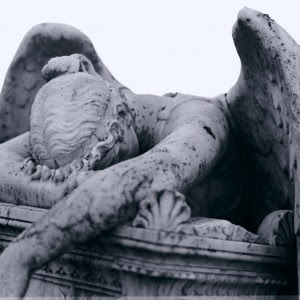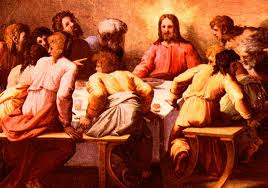
The Tomb of the Unknowns at Arlington National Cemetery in Virginia is guarded by sentinels twenty-four hours a day. The highly structured requirements of the guards convey a deep sense of reverence and symbolism that recognizes the many soldiers who have died in battle but were never identified. The guards are monitored closely and can lose the privilege of serving in that capacity if they fail in keeping the required standards.
As with similar monuments in a variety of nations, the tomb encases the remains of an anonymous warrior that fell in battle while serving his nation. The body serves as an honorific symbol for all soldiers who died in the tragedy of war but were never given a proper burial. These unnamed, unrecognized dead were absorbed into the earth upon which they fell. The guards have no acquaintance with this fallen comrade of a long-ago war, yet they protect that tomb because the assignment has been given and the service is perceived as an act of honor.
The guarding of Jesus’ tomb, however, came about not out of honor but rather through fear. This was not to be a guard that kept a memory alive; it was a guard sent to ensure that the memory would vanish from history. The Jewish leaders requested the guard from Pilate, concerned that the disciples would steal the body and claim that Jesus had risen from the dead (see Matt 27:62-66). They anticipated a disaster should that happen. After all, the only thing worse than a failed Messiah was a resurrected one. To have their public believe such a fabrication would mark the end of their doctrine of control. Their demand for a guard of Roman soldiers caused Pilate to comply without question.
Whether the guards took their assignment seriously or not is a matter of speculation; the protection of the tomb of an executed Jewish peasant probably wasn’t high on their list of key assignments. However, that their governor would demand such action would suggest that insurrection might be a concern—there were, after all, Jews who would love to see the Romans washed out of Israel in a river of their own blood. Even if the guards dismissed the talk of Jesus rising from the dead as religious superstition, they would have been on alert for those who would try to force the prophecy by their own devices.
Matthew tells us that the guards did indeed witness a disturbance of Jesus’ grave, but not in the way they had expected. We are told that an earthquake shook the ground just after the two Marys arrived at the tomb and that an angel appeared, rolling the heavy stone away from the entrance. The guards did not seem to respond to this event like hardened Roman soldiers:
For fear of him the guards shook and became like dead men. But the angel said to the women, “Do not be afraid . . .” (Matt 28:4-5)
The angel ignored the soldiers completely, leaving them to their terror, and turned his attention to the women, inviting them out of their fear into a place of trusting what God was doing. Once the women responded to the angel’s instructions to communicate what had happened to the other disciples, the soldiers recovered from their shock sufficiently to report what had taken place. Interestingly, they did not go to their own military superiors; they went to the religious leaders, who immediately bribed the soldiers in order to buy their silence. The soldiers must have told, with some truthfulness, what they had seen. Had they lied and claimed that they had been overpowered by a band a Jews who had raided the tomb and stolen Jesus’ body, then there would have been no need for their silence to be purchased.
The Bible bears witness to God’s work, at particular times and places in history, in and through his people. The stories, prayers, words of wisdom, letters, and prophetic declarations all point to God and his mission in the world. The guards at the tomb would be witnesses of a different kind. Years later they might have confessed to their comrades that they saw strange, terrifying things during that night of sentry duty. Some might have written the experience off as a result of fatigue or the capricious teasings of some lesser god or goddess. Others, however, might have remembered something different. Perhaps, while assisting at later executions of some early Christians, one of the soldiers would have remembered that awful night and considered the connection between that experience and the death of ones who claimed allegiance to the Jesus of that cold tomb. Either way, such an encounter would not leave even the most stoic warrior unchanged.
At this point in the story, the tomb breaks open, the terrifying angel appears, and two sets of witnesses are dispatched. The women, addressed directly and comfortingly by the angel, are sent to the other disciples. Their testimony would erupt in hope, astonishment, and joy. The guards, shaken from their catatonia, escape with their lives to tell a similar story. This act of witness, however, would result in a cover-up and a denial of the experience; it would be good news for some, and bad news for others.
The apostle Paul understood this counter-dynamic of witness, and said it well:
For we are the aroma of Christ to God among those who are being saved and among those who are perishing; to the one a fragrance from death to death, to the other a fragrance from life to life. (2 Cor. 2:15-16a)
For the faithful, the empty tomb would smell like the freshness of new life. For the others, it would only carry the stink of decay and the weight of fear that comes with the possibility that one’s dominant story of control and certainty is about to be torn to shreds. The report of the guards revealed their recognition that this routine time of execution and burial was like no other they had experienced. For those receiving the report, it would no longer be the death that concerned them; it would be the unraveling of their preferred reality of control that would come with the insistence that in Jesus—the failed, crucified, cursed, would-be Messiah—there was new life.
(This is an excerpt from
Atonement at Ground Zero: Revisiting the Epicenter of Faith, to be released in late 2012 (Wipf and Stock Publishers)















